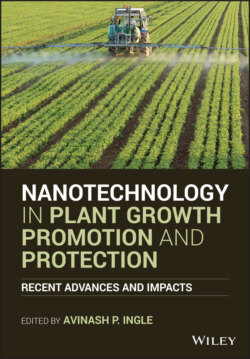Читать книгу Nanotechnology in Plant Growth Promotion and Protection - Группа авторов - Страница 58
3.4 Zn NPs in Crop Protection 3.4.1 Improvement on Disease Resistance
ОглавлениеZnO NPs are well‐known for their antimicrobial activity. Zn based nano‐fungicides are considered ecofriendly in crop disease management. However, studies of its application to control plant diseases are limited. Application of Zn NPs at right concentration range promotes plant growth and increases stress and disease tolerance. ZnO NPs (<50 nm, 100 mg/L) found to reduce spore germination and mycelial growth of some pathogenic fungi such as Alternaria alternata, Botrytis cinerea, Monilia fructicola, Verticillium dahliae, Colletotrichum gloeosporioides, Fusarium oxysporum f. sp. radicis‐lycopersici, and Fusarium solani strains (Malandrakis et al. 2019). A recent study also reported that chitosan encapsulated Zn NPs facilitated disease (Curvularia leaf spot) control in maize through fortifying of plant innate immunity by increasing antioxidant and defense enzymes, balancing of reactive oxygen species (ROS), and enhancing lignin accumulation (Choudhary et al. 2019). Ogunyemi et al. (2019) reported a linear decrease in the population of Xanthomonas oryzae pv. oryzae with the increase in the application rate of biologically synthesized ZnO (40.5–124 nm) up to 16 μg/ml and the maximum result of Zn NPs is to reduce the bacterial population by 68%.
